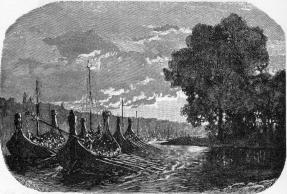Wulfings

TheWulfings,WylfingsorYlfings[Note 1](the name means the "wolf clan" ) was a powerfulclaninBeowulf,Widsithand in the Norsesagas.While the poet ofBeowulfdoes not locate the Wulfings geographically, Scandinavian sources define the Ylfings (theOld Norseform of the name) as the ruling clan of theEastern Geats.[1]
The Wulfings play an important role inBeowulfasBeowulf's fatherEcgþeowof theWægmundingclan had slain one of its members, and was banished for not paying theweregild.The Danish kingHroðgar,who was married toWealhþeow,a Wulfing woman, graciously paid the weregild, and when Beowulf arrived at theDanishcourt in order to slayGrendel,Hroðgar interpreted this as a son's gratitude.
InOld Norsesources, the clan figure prominently in theHeimskringlaand inSögubrot,whereHjörvardand his son Hjörmund belong to it. It is also mentioned in theLay of Hyndlaand inSkáldskaparmálwhere Eiríkr the Wise was one of its members. However, its most famous member wasHelgi Hundingsbanewho had two poems of his own (Helgakviða Hundingsbana IandHelgakviða Hundingsbana II), in thePoetic Edda,and whose story is also retold in theVölsunga saga.
Sam Newtonand others (includingRupert Bruce-Mitford), have proposed that theEast AnglianWuffingdynasty was derived from the Wulfings, and it was at their court thatBeowulfwas first composed.[2]
Location[edit]
According to theNorse sagas,the Wulfings ruled theGeatishpetty kingdomofÖstergötland.
In the first poem (Helgakviða Hundingsbana I),Sinfjötlihas his residence on theBrávellir(seeBattle of the Brávellir). Stanza 42:
|
|
Helgi Hundingsbane resides at Hringstaðir (probably modernRingstad,an old royal estate on the same plain).
In the Heimskringla, Högni was the ruler of Östergötland. The legends of Helge Hundingsbane relate that Högni lost his throne to Helgi Hundingsbane. On the other hand,Sögubrotrelates thatIvar Vidfamnegave the East Geatish throne to Hjörmund, the son of Hjörvard, afterIngjald's death since it had been the kingdom of Hjörmund's father Hjörvard.
- Hann setti konunga ok jarla ok lét ser skatta gjalda; han setti Hjörmund konung, on Hervardar Ylfings, yfir Eystra-Gautland, er átt hafði faðir hans ok Granmarr konungr.
However, this contradicts both the legend of Helge Hundingsbane and theHeimskringlain which the dynasty never lost Östergötland, unless Ivar killed either Högne or Helgi Hundingsbane before giving the throne to their relative Hjörmund.
Known Wulfings[edit]
- Ylfur or Úlfur(Possible ancestor of the clan), based on clans being named after an ancestor.
- Helm Wulfingum ( "Helm of the Wulfings" ), mentioned inWidsith.
- Heaðolaf(Beowulf)
- Helgi Hundingsbane(Edda,Völsunga sagaandNorna-Gests þáttr)
- Hjörvard Ylfing(e.g.HeimskringlaandSögubrot)
- Hjörmund(e.g.HeimskringlaandSögubrot)
- Högne(e.g.Heimskringla)[citation needed]
- Hildur, the son of Högne (e.g.Heimskringla)[citation needed]
- Eric the Wise(Skáldskaparmáland theLay of Hyndla)
- Rikiwulf( "The rich and powerful wolf" ), settled in Flanders in 876 near presentTielt,where he built Rikiwulfinga-haim.
- Wealhþeow,the queen of the Danish kingHroðgar,inBeowulf.
In popular culture[edit]
- Wulfing raiders appear as antagonists inBeowulf: Return to the Shieldlands.
See also[edit]
Footnotes[edit]
- ^Word initialwwas lost before rounded vowels inProto-Norse,e.g.wulfcorresponds toulf,andWulfing/Wylfingcorresponds toYlfing,because theiin the second syllable causes anumlautin the first syllableu->y.
References[edit]
- ^Nerman, Birger (1925).Det svenska rikets uppkomst.Stockholm:Generalstabens litografiska anstalt.
- ^Newton, Sam (2004).The Origins of Beowulf: And the Pre-Viking Kingdom of East Anglia.Boydell & Brewer.ISBN978-0-85991-472-7.
